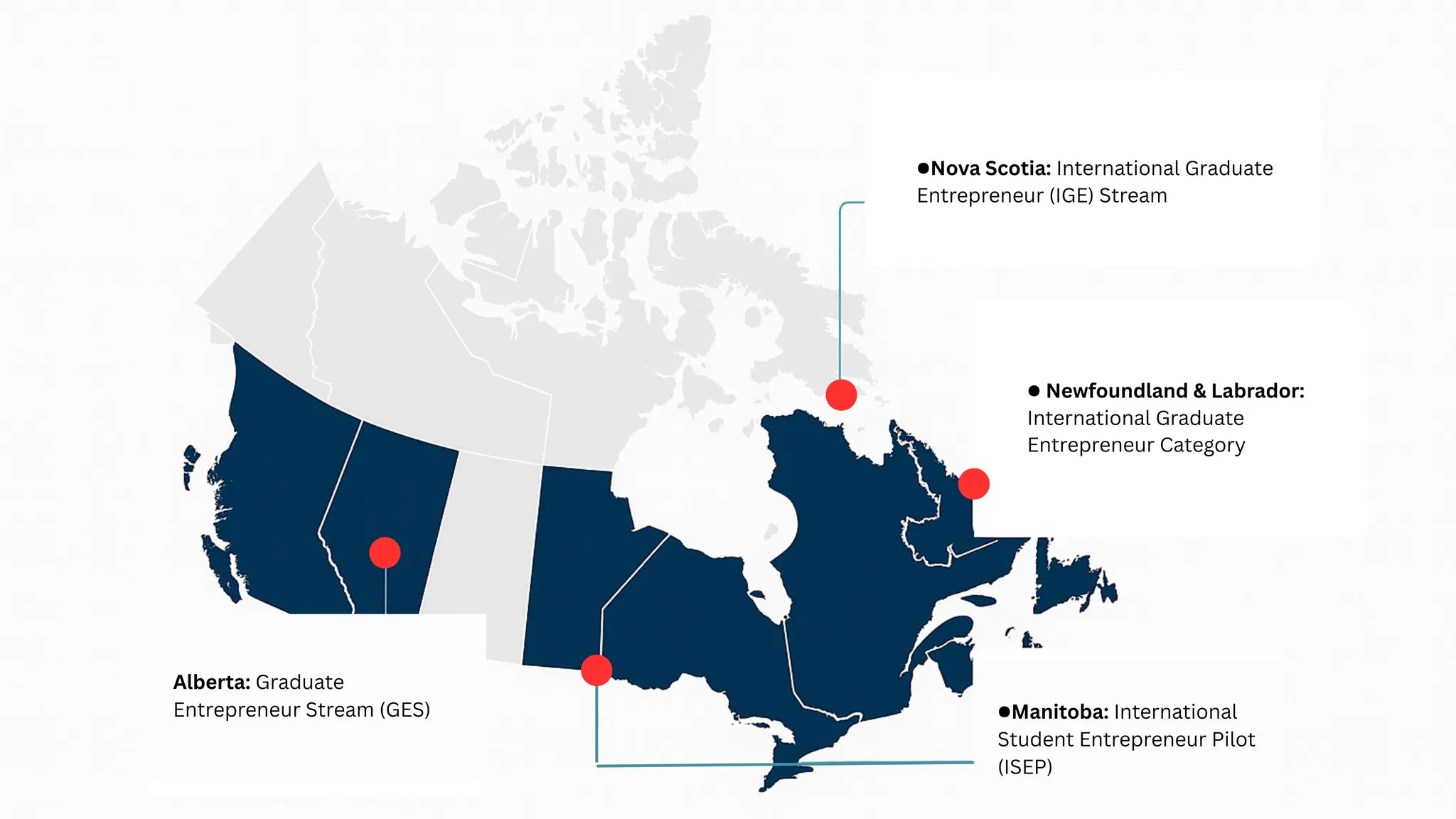If you are an international student entrepreneur in Canada, this comprehensive guide is designed to be a roadmap for you if you wish to apply for permanent residence through business ownership. We will delve deep into the PNP programs specifically tailored for international student entrepreneurs, helping you understand your options, determine your eligibility, and strategically plan your journey from graduate to successful business owner and permanent resident of Canada.
Understanding PNP Programs for Student Entrepreneurs: Your Pathway to Permanent Residency
Provincial Nominee Programs (PNPs) are immigration pathways run by individual provinces in Canada. Each province can select candidates who meet its local needs—whether that means skilled workers, entrepreneurs, or international graduates who want to start a business. For international students, this means you don’t always have to rely on Express Entry or other federal programs alone. A PNP stream can give you a direct route to permanent residence if you meet the requirements of the province and show that your business or skills will benefit the local community.
Four provinces have created dedicated streams for international graduates with entrepreneurial ambitions:
- Nova Scotia: International Graduate Entrepreneur (IGE) Stream
- Newfoundland & Labrador: International Graduate Entrepreneur Category
- Manitoba: International Student Entrepreneur Pilot (ISEP)
- Alberta: Graduate Entrepreneur Stream (GES)
These programs are designed to support you through the challenging early stages of business development while providing a clear and structured process for immigration.
Eligibility Requirements: Are You Qualified?
While each provincial program has its unique nuances, a common set of core requirements forms the foundation for eligibility across the board.
Here are the fundamental eligibility pillars you will need to build:
- Education: A degree or diploma from a post-secondary institution in the province you intend to settle in is non-negotiable. Most programs require a full-time program of at least two years. This demonstrates your commitment to the province and provides you with the local knowledge and networks to succeed.
- Language Proficiency: A strong command of English or French is essential for business success in Canada. All four graduate entrepreneur programs require a minimum Canadian Language Benchmark (CLB) level of 7. This is equivalent to an intermediate to advanced level of proficiency and is tested through designated language tests like IELTS or CELPIP.
- Business Ownership: You must be the driving force behind your business. The programs mandate a minimum ownership stake, typically one-third (33.3%) or, in the case of Manitoba, a majority stake of 51%. This ensures you have significant control and are actively involved in the day-to-day management of the business.
- Active Management: These are not passive investment programs. You are expected to be on the ground, running your business from within the province. This hands-on involvement is a critical factor in assessing your application.
- Post-Graduation Work Permit (PGWP): Your PGWP is the essential bridge between your studies and your entrepreneurial venture. It provides you with the open work authorization needed to legally establish and operate your business in Canada. You must have a valid PGWP at the time of your Expression of Interest (EOI) submission.
If you can answer “yes” to these questions, you are on the right track. The next step is to dive into the specific details of each provincial program to find the one that best aligns with your business goals and personal circumstances.
The Four Provincial Graduate Entrepreneur Programs: A Detailed Comparison
Now that you have a foundational understanding of the common eligibility requirements, it’s time to explore the unique features, advantages, and application processes of the four key provincial programs for international graduate entrepreneurs. Each province has tailored its program to attract specific types of businesses and individuals, so a careful comparison is crucial to finding your perfect fit.
1. Nova Scotia: International Graduate Entrepreneur (IGE) Stream
Nova Scotia, with its growing tech scene and strong maritime economy, offers a comprehensive and supportive environment for new businesses. The IGE stream is designed for recent graduates of a Nova Scotia university or the Nova Scotia Community College (NSCC).
Key Advantages:
- Supportive Ecosystem: The program provides a high level of support, including a mandatory Review Engagement and Special Purpose Report, which helps you build a strong financial case for your business.
- Export Focus: The province encourages businesses with export potential, offering valuable points for those looking to tap into international markets.
- Rural Incentive: You can also gain points for establishing your business in a rural community, which can offer lower operating costs and a tight-knit support network.
Detailed Requirements:
- Education: You must have completed a full-time program of at least two years from a recognized Nova Scotia university or the NSCC.
- Business Operation: You need to have been actively running your business in Nova Scotia for at least one year before you can apply.
- Ownership: A minimum of 33.3% ownership is required.
- Language: You must demonstrate a CLB 7 level of language proficiency.
- Financials: You must meet the Low Income Cut-Off (LICO) as defined by Statistics Canada.
Unique Features:
The Nova Scotia program includes a mandatory in-person interview and a visit to your business site. This hands-on approach allows the province to gain a deep understanding of your business and your commitment to its success. You will also need to work with a professional third-party to conduct a financial assessment of your business. For new businesses, there is a job creation requirement, demonstrating your contribution to the local economy.
Success Tips:
Focus on building a business with strong export potential or one that can thrive in a rural Nova Scotian community. Be prepared for a rigorous review process and ensure your financial documentation is impeccable. The in-person interview is your chance to shine, so be ready to articulate your vision and demonstrate your passion for your business.
2. Newfoundland & Labrador: International Graduate Entrepreneur Category
Newfoundland and Labrador, with its rich natural resources and growing technology sector, offers a points-based system that provides a clear and transparent path for international graduate entrepreneurs. The program is designed for graduates of Memorial University or the College of the North Atlantic.
Key Advantages:
- High Success Rates: The comprehensive assessment process leads to high success rates for those who meet the criteria.
- Priority Sectors: The province prioritizes businesses in high-demand sectors, including Technology, Agriculture, Aquaculture, and Natural Resources. If your business falls into one of these categories, you will have a significant advantage.
- Clear Points System: The program uses a points-based system with a maximum of 110 points, and a minimum of 67 points required to be eligible. This allows you to clearly assess your chances of success.
Detailed Requirements:
- Education: You must have graduated from Memorial University or the College of the North Atlantic with a degree or diploma from a program of at least two years, completed within two years of submitting your EOI.
- Business Experience: You need to have at least one year of continuous experience managing and owning your current business.
- Ownership: A minimum of 33.3% ownership is required.
- Language: You must demonstrate a CLB 7 level of language proficiency.
Success Tips:
Align your business with one of the priority sectors to maximize your points. Focus on achieving a high language score, as this is a significant component of the assessment. Your business plan should clearly articulate how your business will contribute to the economic priorities of the province.
3. Manitoba: International Student Entrepreneur Pilot (ISEP)
Manitoba’s ISEP is a unique pilot program with some of the strictest requirements, creating a focused and competitive environment for a limited number of dedicated student entrepreneurs. The program is designed for graduates of a Manitoba post-secondary institution.
Key Advantages:
- Focused Competition: The strict age limit of 21-35 years creates a smaller, more focused pool of applicants.
- High Ownership Requirement: The 51% ownership requirement ensures that you have full control over your business and its direction.
- Structured Agreement: The Business Performance Agreement (BPA) provides a clear and structured framework for your business operations and milestones.
Detailed Requirements:
- Education: You must have completed a full-time program of at least two years in Manitoba.
- Business Operation: You need to have at least six months of experience as a senior manager of your business in Manitoba.
- Ownership: A majority ownership of 51% is required.
- Language: You must demonstrate a CLB 7 level of language proficiency.
- Work Permit: You must have a valid open work permit at the time of your application.
Unique Features:
The ISEP program requires a mandatory Business Performance Agreement (BPA), which outlines the terms and conditions of your business operation. You will also need to undergo a third-party net worth verification and have liquid funds equivalent to the Low Income Cut-Off (LICO) for 12 months.
Success Tips:
Be prepared to take on a majority ownership role and demonstrate strong financial standing. The Business Performance Agreement is a serious commitment, so ensure your business plan is realistic and achievable. This program is best suited for entrepreneurs who are confident in their ability to lead and grow a business independently.
4. Alberta: Graduate Entrepreneur Stream (GES)
Alberta’s Graduate Entrepreneur Stream offers the most flexibility in terms of timeline, making it an attractive option for graduates who need more time to develop their business concept. The program is for graduates of a publicly funded post-secondary institution in Alberta.
Key Advantages:
- Flexible Timeline: You can establish your business after you have been approved for the program, giving you more time to refine your business plan and secure funding.
- No Mandatory Third-Party Reports: Unlike other provinces, Alberta does not require mandatory third-party financial reports, which can save you time and money.
- Optional Interview: The interview process is optional, which can streamline the application process.
- Established Business Pathway: If you have already been operating a business in Alberta for at least one year, you can apply through the established business option and avoid any additional waiting periods.
Detailed Requirements:
- Education: You must have completed a full-time program of at least two years at a publicly funded post-secondary institution in Alberta.
- Work Permit: You must have a valid PGWP at the time of your EOI submission.
- Ownership: A minimum of 34% ownership is required.
- Language: You must demonstrate a CLB 7 level of language proficiency.
Success Tips:
Take advantage of the flexible timeline to build a strong and well-researched business plan. Focus on maximizing your points in the business factors category, which includes your business plan, investment, and job creation potential. The established business option is a great choice if you are already up and running, as it can significantly speed up the process.
Step-by-Step Application Process: A Strategic Timeline
Your immigration journey can be broken down into four distinct phases, each with its own set of critical tasks and milestones. By understanding this timeline, you can proactively manage your progress and maximize your chances of success.
Phase 1: Preparation During Your Studies
Your entrepreneurial journey begins long before you graduate. The time you spend in your academic program is a golden opportunity to lay the groundwork for your future business.
- Validate Your Business Idea: Use your coursework, research projects, and access to academic resources to test and refine your business concept. Conduct market research, analyze your competition, and develop a preliminary business plan.
- Build Your Network: Connect with your university’s entrepreneurship center, join student clubs, and attend industry events. Seek out mentors who can provide guidance and support. Your professors and classmates can also be valuable resources.
- Gain Relevant Experience: Participate in co-op programs, internships, or part-time work in your field of interest. This will not only provide you with valuable skills but also help you build a professional network in Canada.
Phase 2: Business Establishment on Your PGWP
Your Post-Graduation Work Permit (PGWP) is the key that unlocks your entrepreneurial potential. It provides you with the legal authorization to work for any employer, including your own business.
- Apply for Your PGWP Immediately: You must apply for your PGWP within 180 days of receiving your final marks. Do not delay this crucial step.
- Register Your Business: Choose the appropriate legal structure for your business (sole proprietorship, partnership, or corporation) and register it with the appropriate government authorities.
- Establish Your Operations: Secure a business location, purchase necessary equipment, and hire your initial staff. This is also the time to obtain any required licenses, permits, and insurance.
Phase 3: Program Application and Provincial Nomination
Once your business is up and running and you meet the specific requirements of your chosen provincial program, you can begin the application process.
- Submit an Expression of Interest (EOI): This is the first step in the application process for all four graduate entrepreneur programs. Your EOI will be scored based on the program’s criteria, and you will be entered into a pool of candidates.
- Receive an Invitation to Apply (ITA): If your EOI is selected, you will receive an ITA to submit a full application.
- Submit a Full Application: This will include your detailed business plan, financial statements, language test results, and other supporting documents. Be prepared for a thorough review of your application.
- Receive a Provincial Nomination: If your application is approved, you will receive a provincial nomination certificate, which is your ticket to applying for permanent residence.
Phase 4: Permanent Residence Application
With your provincial nomination in hand, you can now apply for permanent residence with Immigration, Refugees and Citizenship Canada (IRCC).
- Submit Your PR Application: You will submit your application through the Provincial Nominee Program stream of the Express Entry system.
- Receive Your Confirmation of Permanent Residence (COPR): Once your application is approved, you will receive your COPR, and you can officially begin your new life as a permanent resident of Canada.
The entire process, from starting your business to receiving your permanent residence, can take several years. Patience, persistence, and a well-executed plan are essential for success.
Alternative Pathways: Beyond PNP Programs
While the provincial graduate entrepreneur programs are an excellent option for many, they are not the only path to entrepreneurial success in Canada. Depending on your business idea, your background, and your long-term goals, you may want to consider these alternative pathways.
Start-Up Visa Program
Canada’s federal Start-Up Visa Program is designed to attract innovative entrepreneurs who can build businesses that can compete on a global scale. Unlike the PNP programs, the Start-Up Visa does not require you to have graduated from a Canadian institution. However, it does have its own unique set of requirements.
- Support from a Designated Organization: You must have the support of a designated Canadian venture capital fund, angel investor group, or business incubator. This is the most critical requirement of the program.
- Innovative Business Idea: Your business must be innovative and have the potential for high growth.
- Language Proficiency: A CLB 5 level of language proficiency is required, which is lower than the PNP programs.
- Settlement Funds: You must have sufficient funds to support yourself and your family after you arrive in Canada.
The Start-Up Visa program has seen explosive growth in recent years, with a 913.5% increase in the number of permanent residents welcomed in the first third of 2024 compared to the same period in 2023. This indicates a strong government commitment to attracting top entrepreneurial talent from around the world.
Success Strategies and Common Pitfalls for International Students Starting a Business in Canada
- Get Your Business Plan Right from the Start
Don’t treat your business plan as a formality. Provinces will hold you to it. One of our clients got approval for an ice cream shop, but later wanted to switch to a coffee shop — and had to restart the process. Choose a concept you can commit to, back it up with real market research, and make sure your financial projections are realistic. - Protect Your Money When Buying a Business
If you’re looking at purchasing an existing business, know that sellers often prefer local buyers who can close quickly. We’ve seen clients lose deposits or get sidelined even when offering more money. Always structure contracts carefully, avoid large upfront payments without safeguards, and be prepared with alternatives if a seller won’t wait. - Run Your Plans by an Immigration Lawyer
Family, friends, and brokers may want to help, but they don’t always understand immigration rules. One client almost bought a café with $50,000 tied to “goodwill,” which Alberta doesn’t count as an eligible investment. With the right advice, we restructured the deal so the investment qualified. Before you commit funds, make sure your business decisions align with immigration requirements.
Conclusion: Look Beyond Express Entry
For many international students, Express Entry is the default immigration pathway. But if your true goal is to build something of your own, the Provincial Nominee Programs for graduate entrepreneurs may be a better fit. These streams allow you to turn your education into a business and your business into permanent residence.
Yes, the process requires planning, persistence, and smart decisions, but the payoff is worth it. Your Canadian education, paired with your international perspective, can give you an edge in Canada’s growing economy. By looking beyond Express Entry and exploring entrepreneur-focused PNPs, you open doors not just to permanent residency but to a future where you control your career, create jobs, and shape your community.
Frequently Asked Questions (FAQ)
Can international students start a business in Canada while studying?
Yes, international students can start a business in Canada, but there are important limitations. Your study permit allows you to work off-campus for up to 24 hours per week during study periods. Business operations are also considered “working off-campus.” For full entrepreneurial freedom, you’ll need a Post-Graduation Work Permit (PGWP) after graduation.
What is the minimum investment required for PNP entrepreneur programs?
Most provincial graduate entrepreneur programs do not specify a minimum investment amount. However, you must demonstrate sufficient funds to meet the Low Income Cut-Off (LICO) requirements and operate your business successfully. Alberta’s program awards points for investments starting at $25,000.
How long does the PNP entrepreneur application process take?
The entire process from business establishment to permanent residency typically takes 2-4 years. This includes 1 year of business operation (required by most programs), 6-12 months for provincial nomination processing, and 12-18 months for federal permanent residence processing.
Which province has the easiest PNP entrepreneur program for international students?
Each province has different advantages: Alberta offers the most flexible timeline, Nova Scotia provides comprehensive support, Newfoundland & Labrador has a clear points system, and Manitoba offers the highest ownership control. The “easiest” depends on your specific circumstances and business type.
Do I need to hire Canadian employees for my business?
Most programs require job creation for new businesses, typically at least one full-time equivalent position for a Canadian citizen or permanent resident. The specific requirements vary by province and business type.
Can I apply to multiple provincial entrepreneur programs simultaneously?
While technically possible, it’s not recommended as each program requires significant time, resources, and commitment to a specific province. Focus on the program that best aligns with your business goals and location preferences.
What happens if my business fails after receiving a provincial nomination?
If your business fails after receiving provincial nomination but before obtaining permanent residence, your nomination may be revoked. After becoming a permanent resident, you’re generally not required to continue the business, though some provinces may have monitoring periods.
Is language testing required for all PNP entrepreneur programs?
Yes, all four graduate entrepreneur programs require a minimum Canadian Language Benchmark (CLB) level of 7 in English or French. This must be demonstrated through approved language tests like IELTS, CELPIP, or TEF.
Disclaimer: This blog post is for informational purposes only and does not constitute legal advice. Immigration laws and regulations are complex and subject to change. You should always consult with a qualified immigration professional for advice tailored to your specific situation.
About the Author
Feruza Djamalova is a licensed Canadian immigration lawyer at Sobirovs Law Firm, a boutique practice dedicated to helping business owners, entrepreneurs, and international students build their future in Canada. Since 2012, she has guided hundreds of clients through complex immigration pathways, including the Alberta Graduate Entrepreneur Stream, Provincial Nominee Programs, and the Start-Up Visa.
Feruza is widely recognized for her clear, practical approach to immigration law. She has been featured in leading publications such as TechCrunch and Forbes for her insights on business immigration and global talent mobility. Clients value her transparency, empathy, and strategic advice, which help them navigate the challenges of entrepreneurship and immigration with confidence.

















